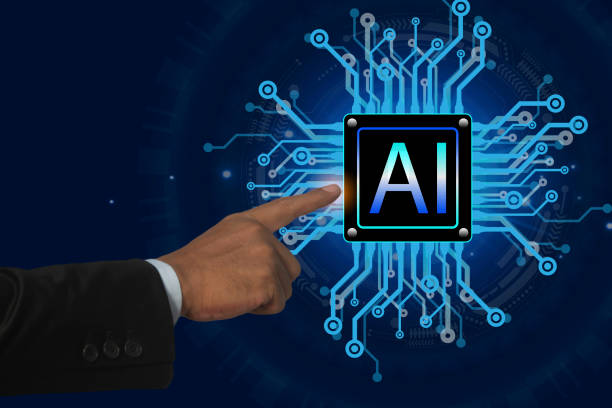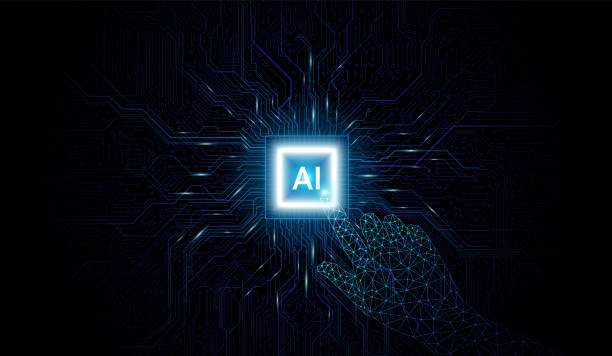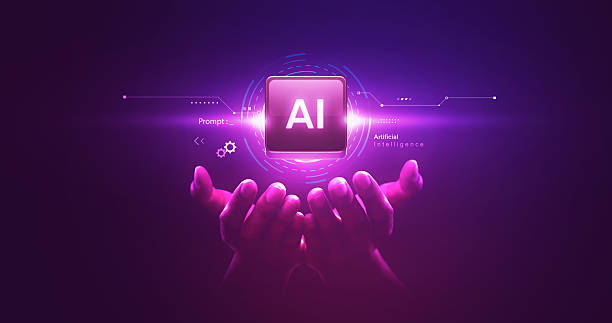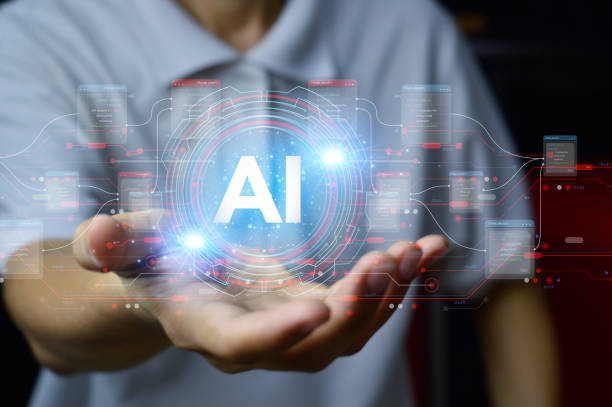What is Artificial Intelligence and what are its applications?
Artificial Intelligence (Artificial Intelligence – AI), in short, refers to the ability of a computer system to perform tasks that usually require human intelligence.
These tasks include learning, reasoning, problem-solving, understanding natural language, pattern recognition, and decision-making.
#ArtificialIntelligence is actually an attempt to simulate human thinking processes in machines.
Today, artificial intelligence has permeated a wide range of industries and applications.
Some key applications of artificial intelligence include:
- Self-driving cars : Artificial intelligence systems are able to analyze data from sensors and cameras to drive without human intervention.
- Medicine : Artificial intelligence helps doctors in diagnosing diseases, developing drugs, and personalizing treatment.
- Customer Service : AI-powered chatbots and automated response systems can answer customer questions and resolve their issues.
- Finance : Artificial intelligence is used in fraud detection, risk management, and providing investment recommendations.
- Manufacturing: Artificial intelligence is used to optimize production processes, control quality, and predict equipment failure.
These are just a few examples of the widespread applications of artificial intelligence.
As technology advances, artificial intelligence is expected to play an increasingly important role in our daily lives.
Are you tired of losing customers due to poor e-commerce website design? With Rasaweb, solve this problem forever!
✅ Increase sales and visitor-to-customer conversion rate
✅ Smooth and attractive user experience for your customers⚡ Get free consultation
History and Evolution of Artificial Intelligence
The idea of artificial intelligence dates back to the 1950s, when researchers began exploring the possibility of building machines that could think like humans.
One of the important milestones in this field was the invention of the Turing machine, which provided a theoretical computational model to demonstrate the feasibility of automated computation.
In 1956, a conference was held at Dartmouth College, which is widely recognized as the official birth of artificial intelligence.
In the early decades, artificial intelligence was met with great enthusiasm, but progress was slow due to hardware and software limitations.
In the 1980s, interest in artificial intelligence was revived with the emergence of expert systems that applied specialized knowledge in specific fields.
However, these systems also faced problems such as the inability to learn and generalize.
In recent decades, significant advances in fields such as Machine Learning and Neural Networks have led to a quantum leap in the capabilities of artificial intelligence.
Today, Deep Learning neural networks are capable of solving complex problems that were previously unimaginable.
These advances have made artificial intelligence a transformative force in many industries.
Machine Learning and its Types
Machine learning is a subset of artificial intelligence that allows computer systems to learn from data without explicit programming.
In fact, instead of instructing the machine on how to perform a specific task, it is given a lot of data to discover the patterns and relationships in the data itself and make decisions based on them.
There are different types of machine learning, which include:
- Supervised Learning : In this type of learning, the machine is given labeled data, which means that the correct answer is also specified for each data.
The machine tries to learn a model that can predict the correct answer for new data. - Unsupervised Learning : In this type of learning, the machine is given unlabeled data.
The machine tries to discover the hidden patterns and structures in the data. - Reinforcement Learning : In this type of learning, an agent is placed in an environment and receives rewards or penalties for performing different actions.
The agent tries to learn a strategy that will yield the most rewards.
Each of these types of machine learning has its own specific applications and can be used depending on the type of problem.
| Learning Type | Data Type | Goal | Example |
|---|---|---|---|
| Supervised Learning | Labeled | Predict the correct answer | Image recognition, stock price prediction |
| Unsupervised Learning | Unlabeled | Discover patterns and structures | Customer clustering, data dimension reduction |
| Reinforcement Learning | Interaction with the environment | Optimize strategy to get the most rewards | Computer games, robotics |
Click here to preview your posts with PRO themes ››
Neural Networks and Deep Learning
Neural Networks are computational models that are inspired by the structure of the human brain.
These networks consist of multiple layers of nodes (neurons) that are connected to each other.
Each node receives an input, processes it, and produces an output.
The output of each node is sent as input to the other nodes in the next layer.
By adjusting the weight of the connections between the nodes, the neural network can learn the patterns and relationships in the data.
Deep Learning is a type of machine learning that uses neural networks with a very large number of layers (deep neural networks).
These networks are capable of learning complex and abstract features from data.
For example, a deep neural network can learn how to recognize faces in images or how to translate a language.
Deep learning has made significant advances in recent years and provides better performance than traditional machine learning methods in many fields.
These advances have been made possible by factors such as increased computer processing power, access to large data, and the development of new algorithms.
Does your current company website not reflect the credibility and power of your brand as it should? Rasaweb solves this challenge for you by designing a professional company website.
✅ Increase the credibility and trust of visitors
✅ Attract more targeted customers
⚡ Click to receive a free consultation!
Natural Language Processing (NLP) and its Applications
Natural Language Processing (NLP) is a branch of artificial intelligence that deals with the interaction between computers and human language.
The goal of NLP is to give computers the ability to understand, interpret, and generate human language.
Some of the important applications of NLP include:
- Machine translation : Automatic translation of text from one language to another.
- Sentiment analysis : Detection of the attitude or sentiments of the author of the text (e.g. positive, negative or neutral).
- Chatbots: Computer programs that can converse with humans in natural language.
- Text summarization : Generating an automatic summary of a long text.
- Speech recognition : Converting speech to text.
NLP uses various techniques such as machine learning, neural networks and linguistic rules to process human language.
With recent advances in this field, NLP has become a powerful tool for solving various problems in fields such as customer service, marketing, and education.
Computer Vision and its Applications
Computer Vision is a branch of artificial intelligence that gives computers the ability to see and interpret images and videos.
The goal of computer vision is to enable computers to understand images like humans and extract useful information from them.
Some of the important applications of computer vision include:
- Face recognition : Detecting and identifying people’s faces in images and videos.
- Object detection : Detecting and identifying various objects in images and videos (e.g. cars, humans, animals).
- Self-driving cars: Using cameras and sensors to understand the environment and drive without human intervention.
- Medical imaging : Helping doctors diagnose diseases by analyzing medical images (such as MRI and CT Scan).
- Quality control: Using cameras and machine vision systems to check the quality of products on the production line.
Computer vision uses various algorithms such as neural networks, pattern recognition algorithms, and image processing techniques to analyze images and videos.
With recent advances in this field, computer vision has become a powerful tool for solving various problems in fields such as security, manufacturing, and health.
Challenges and Limitations of Artificial Intelligence
Despite significant advances, artificial intelligence still faces numerous challenges and limitations.
One of the main challenges is the need for large and high-quality data to train machine learning models.
In many cases, collecting and labeling data can be time-consuming and costly.
In addition, machine learning models may perform poorly on new or different data.
Click here to preview your posts with PRO themes ››
Another important challenge is the interpretability of artificial intelligence models.
In many cases, it is difficult to understand why an artificial intelligence model has made a particular decision.
This can reduce confidence in these models and limit their use in sensitive areas such as medicine and law.
In addition, artificial intelligence also faces numerous ethical issues.
For example, the use of artificial intelligence in decision-making systems can lead to discrimination and inequality.
Also, the use of artificial intelligence in autonomous weapons can have disastrous consequences.
| Challenge | Description |
|---|---|
| Need for big data | Machine learning models need a lot of data for training. |
| Interpretability | It is difficult to understand why an artificial intelligence model has made a particular decision. |
| Ethical issues | Artificial intelligence can lead to discrimination and inequality. |
Addressing these challenges and limitations is necessary for the responsible development and use of artificial intelligence.
The Future of Artificial Intelligence and its Impact on Society
The future of artificial intelligence is bright and full of potential.
With continued advances in fields such as machine learning, neural networks, and natural language processing, artificial intelligence is expected to play an increasingly important role in our daily lives.
#ArtificialIntelligence can help solve complex problems in areas such as health, education, the environment, and energy.
Artificial intelligence can also have a significant impact on the labor market.
While artificial intelligence can automate some jobs, it can also create new job opportunities.
For example, with the increasing use of artificial intelligence, the need for specialists who can design, develop and maintain these systems will increase.
In general, artificial intelligence can help improve the quality of human life and lead society towards progress and prosperity.
However, it is necessary to pay attention to the challenges and ethical issues related to artificial intelligence and try to use this technology responsibly and sustainably.
#ArtificialIntelligence will play a more prominent role in our lives in the coming years.
You still don’t have a company website and you are missing online opportunities? With professional company website design by Rasaweb,
✅ Double the credibility of your business
✅ Attract new customers
⚡ Free consultation for your company website!
Key Concepts in Artificial Intelligence
To better understand artificial intelligence, it is necessary to be familiar with some key concepts #ArtificialIntelligence.
These concepts include:
- Algorithm : A set of instructions designed to solve a particular problem.
- Data: Information used to train and evaluate machine learning models.
- Model: A mathematical representation of the patterns and relationships in the data.
- Learning: The process of adjusting the parameters of a model to improve its performance on a particular task.
- Evaluation: The process of measuring the performance of a model on a particular task.
These concepts are fundamental to understanding how artificial intelligence systems work and developing them.
By understanding these concepts, you can interact more effectively with this technology and benefit from its potential.
#ArtificialIntelligence is a powerful and growing tool.
Artificial Intelligence Learning Resources
If you are interested in learning more about artificial intelligence, there are many resources available to you.
Some of these resources include:
- Online courses : Online educational platforms such as Coursera, edX, and Udacity offer a variety of courses in the field of artificial intelligence.
- Books : There are many books in the field of artificial intelligence that you can use to learn basic concepts and techniques.
- Scientific articles : Websites like arXiv provide free access to scientific articles in the field of artificial intelligence.
- Online forums and groups : There are many online forums and groups where you can connect with other artificial intelligence enthusiasts and learn from them.
By using these resources, you can increase your knowledge and skills in the field of artificial intelligence and become an expert in this field #ArtificialIntelligence.
Remember that learning artificial intelligence is a continuous process and requires effort and perseverance.
#ArtificialIntelligence can help you progress.
Click here to preview your posts with PRO themes ››
FAQ
| Question | Answer |
|---|---|
| 1. What is Artificial Intelligence (AI)? | It is a branch of computer science that aims to create machines capable of simulating human intelligence and performing tasks that require human thinking, such as learning, problem-solving, and decision-making. |
| 2. What are the main types of artificial intelligence? | They can be classified into Weak AI (Narrow AI), which focuses on a specific task, General AI, which possesses comprehensive human capabilities, and Super AI, which exceeds human intelligence. |
| 3. Mention some common applications of artificial intelligence in our daily lives. | They include voice assistants (such as Siri and Alexa), recommendation systems (such as Netflix and Amazon), self-driving cars, facial recognition systems, and spam filters. |
| 4. What is the difference between artificial intelligence and machine learning? | Artificial intelligence is the broader concept of creating intelligent machines, while machine learning is a subset of artificial intelligence that focuses on enabling systems to learn from data without explicit programming. |
| 5. What is Deep Learning? | It is a subset of machine learning that uses multi-layered artificial neural networks (deep neural networks) to process data and discover complex patterns, and it is used in image and speech recognition. |
| 6. What are the most important benefits of artificial intelligence? | Improving efficiency and productivity, automating repetitive tasks, making better decisions based on big data analysis, and developing solutions to complex problems in fields such as medicine and science. |
| 7. What are the main challenges facing the development and deployment of artificial intelligence? | They include the need for huge amounts of high-quality data, privacy and security issues, bias in data and algorithms, and high development and maintenance costs. |
| 8. Does artificial intelligence raise ethical or social concerns? | Yes, it raises concerns about privacy, algorithmic bias, job loss due to automation, and responsibility for errors made by intelligent systems, and the need for a regulatory framework. |
| 9. How can artificial intelligence affect the future of the labor market? | It can lead to the automation of some routine tasks, but it will also create new jobs that require advanced skills in the development, operation, and maintenance of artificial intelligence systems. |
| 10. What are some modern or promising technologies in the field of artificial intelligence? | They include advanced natural language processing (NLP) (such as large language models like ChatGPT), computer vision, robotics, and Generative AI. |
And other services of Rasa Web advertising agency in the field of advertising
Smart Reportage: A new service to increase sales by customizing the user experience.
Smart Marketplace: A fast and efficient solution to attract customers by focusing on attractive user interface design.
Smart UI/UX: A new service to increase campaign management through dedicated programming.
Smart Digital Advertising: A new service to increase website visits through precise audience targeting.
Smart Marketplace: A combination of creativity and technology to manage campaigns through marketing automation.
And more than hundreds of other services in the field of internet advertising, advertising consulting and organizational solutions
Internet Advertising | Advertising Strategy | Advertisement Reportage
Resources
What is artificial intelligence? Types, applications, challenges
,What is artificial intelligence? What are its types and applications?
,What is artificial intelligence? (Artificial Intelligence)
,What is Artificial Intelligence (AI)? – In simple language
? Are you ready to transform your business in the digital space? Rasaweb Afarin Digital Marketing Agency, by providing specialized and integrated solutions, including advanced services of WordPress website design, helps you to have a powerful and impressive presence in the online world.
📍 Tehran, Mirdamad Street, next to the Central Bank, South Kazerun Alley, Ramin Alley No. 6
“`














